from Apr. 15, 1865
Telegram calling for the arrest of John Wilkes Booth
-
Full Title
Telegram calling for the arrest of John Wilkes Booth
-
Description
A telegram from Col. E.B. Alexander in St. Louis, MO to Capt. Hubbard in Springfield IL calling for the arrest of John Wilkes Booth.
-
Source
Special Collections Research Center, University of Chicago Library
-
Rights
This item is in the public domain and may be reproduced and used for any purpose, including research, teaching, private study, publication, broadcast or commercial use, with proper citation and attribution.
-
Tags
-
Cite this Item
E.B. Alexander. "Telegram calling for the arrest of John Wilkes Booth". Remembering Lincoln. Web. Accessed December 14, 2025. https://rememberinglincoln.fords.org/node/1173
-
Creator
E.B. Alexander
-
Date
April 15, 1865
from Apr. 15, 1865
Telegram calling for the arrest of John Wilkes Booth
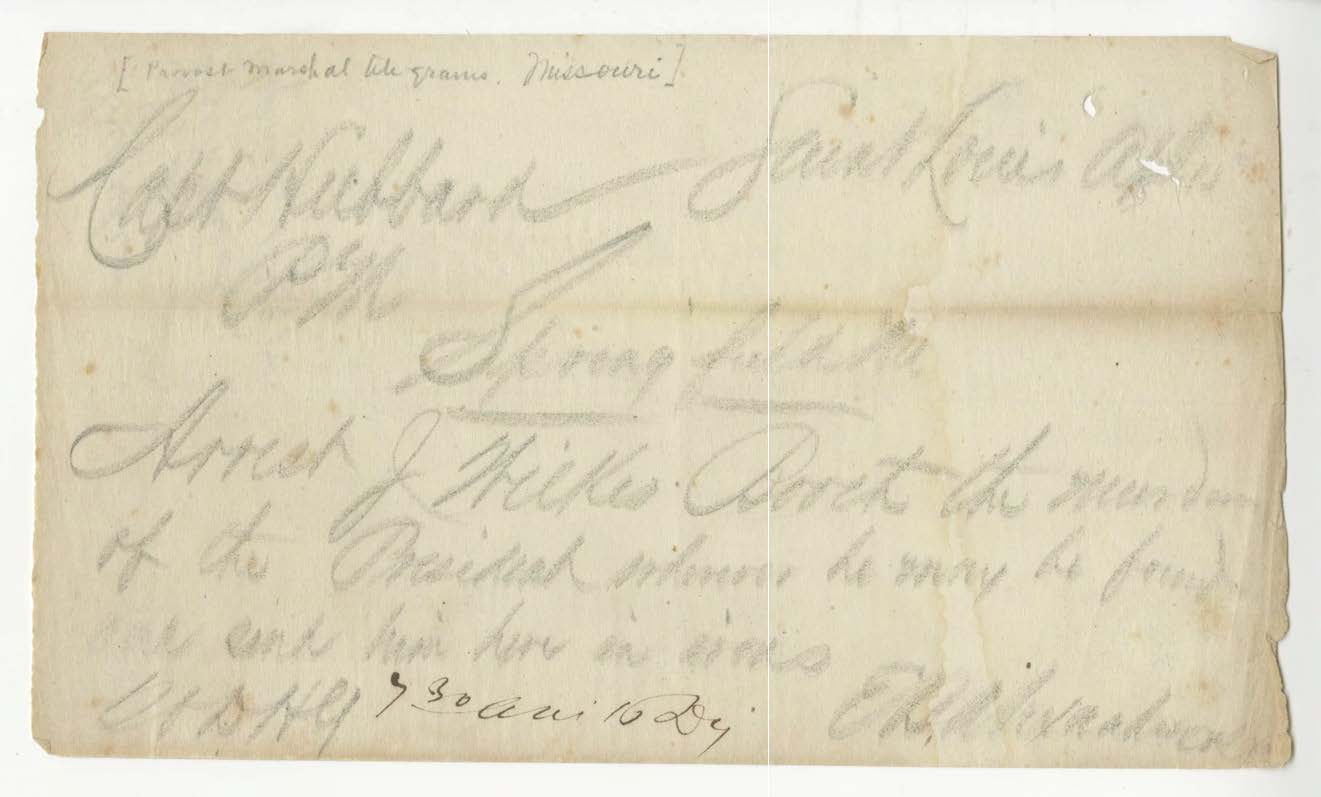
-
Description
A telegram from Col. E.B. Alexander in St. Louis, MO to Capt. Hubbard in Springfield IL calling for the arrest of John Wilkes Booth.
-
Source
Special Collections Research Center, University of Chicago Library
-
Rights
This item is in the public domain and may be reproduced and used for any purpose, including research, teaching, private study, publication, broadcast or commercial use, with proper citation and attribution.
-
Creator
E.B. Alexander
-
Date
April 15, 1865
from May. 1, 1865
When Lilacs Last in the Door-Yard Blooms
-
Full Title
When Lilacs Last in the Door-Yard Bloom'd in the Sequel to Drum-Taps
-
Description
In 1865, Walt Whitman published Drum-Taps, a collections of poems written during the war. A sequel was published the following year, which included Oh Captain! My Captain! and When Lilacs Last in the Door-Yard Bloom'd, both written in response to the Lincoln Assassination. When Lilacs Last in the Door-Yard Bloom'd was written in the form of an elegy during the summer of 1866.
-
Source
-
Rights
This item is in the public domain and may be reproduced and used for any purpose, including research, teaching, private study, publication, broadcast or commercial use, with proper citation and attribution.
-
Tags
-
Cite this Item
Walt Whitman. "When Lilacs Last in the Door-Yard Bloom'd in the Sequel to Drum-Taps". Remembering Lincoln. Web. Accessed December 14, 2025. https://rememberinglincoln.fords.org/node/1172
-
Creator
Walt Whitman
-
Date
Summer 1865
from May. 1, 1865
When Lilacs Last in the Door-Yard Bloom'd in the Sequel to Drum-Taps
-
Description
In 1865, Walt Whitman published Drum-Taps, a collections of poems written during the war. A sequel was published the following year, which included Oh Captain! My Captain! and When Lilacs Last in the Door-Yard Bloom'd, both written in response to the Lincoln Assassination. When Lilacs Last in the Door-Yard Bloom'd was written in the form of an elegy during the summer of 1866.
-
Source
-
Rights
This item is in the public domain and may be reproduced and used for any purpose, including research, teaching, private study, publication, broadcast or commercial use, with proper citation and attribution.
-
Creator
Walt Whitman
-
Date
May 1, 1865
from Apr. 24, 1865
Letter to Benjamin Thackara from A. M. Thackara, April 24, 1865.
-
Full Title
Letter to Benjamin Thackara from A. M. Thackara, April 24, 1865.
-
Description
A Letter from A. M. Thackara to his father Benjamin Thackara recounting Lincoln's funeral train's stop in Philadelphia.
-
Transcription
Apr. 24, 1865
Phila April 24/65
Dear Pop
We received your letter this morning, every time I come home from the store in the evenings Mother asks me if I had heard from you. Celie has been staying at our house ever since you left. We have grand times. Yesterday the Presidents body laid in state at Independence Hall. I never saw such a crowd in my life. They were four a beast from the State House to 21st Street. At 6th Street in the morning the policemen had a hard issue of it. They had to beat the people back with their clubs. In the afternoon a regiment of the Provost Guard came down. There was a double file across the street at charge bayonets. I did not get to see the body. Those that did see it say that he looked natural. There was a grand funeral escort given “him”. But it was so dark that we could not see much of it. Mr Miskey paraded with the Union League. There is a notice at home for you to parade, but of course you cannot do it. There are two letters from Dr. Stocker, one to you and another to Mr Miskey, which one enclosing a check for the amount of your bill $59.50. He wants several things. He says he is going to send you a couple of boxes to store for him. Meree wrote an order for 2 old stogies #4988. Those large chandeliers of which we have so many. While I was writing this there was a letter came for you which I will send to Columbus. That package of lithographs for Gilfillen & Sons Hartford has returned. I was at Church last evening and heard a splendid sermon from Mr Coukling on the wages of sins is death of course he spoke about the death of our beloved President. I think that General Sherman has just about killed himself for agreeing to such terms of capitulation with Joe Johnston but however I think Genl Grant will bring it all right. He went through here on his way to North Carolina. He bid his family good bye. The people are down on Sherman now. I think that I have told you all the news I can think of now. So good bye.
From your Affectionate Son, A. M. Thackara
P.S. Write to me
[Transcription by Stephanie Dabek.] -
Source
-
Rights
This item is in the public domain and may be reproduced and used for any purpose, including research, teaching, private study, publication, broadcast or commercial use, with proper citation and attribution.
-
Tags
-
Cite this Item
A. M. Thackara. "Letter to Benjamin Thackara from A. M. Thackara, April 24, 1865.". Remembering Lincoln. Web. Accessed December 14, 2025. https://rememberinglincoln.fords.org/node/1171
-
Creator
A. M. Thackara
-
Date
April 24, 1865
from Apr. 24, 1865
Letter to Benjamin Thackara from A. M. Thackara, April 24, 1865.
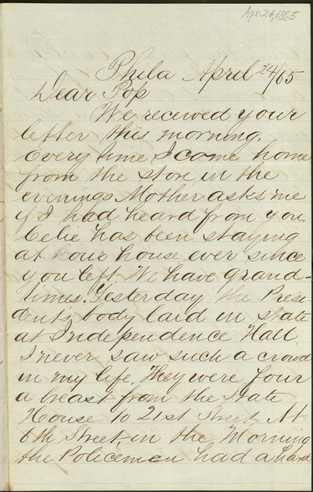
-
Description
A Letter from A. M. Thackara to his father Benjamin Thackara recounting Lincoln's funeral train's stop in Philadelphia.
-
Source
-
Rights
This item is in the public domain and may be reproduced and used for any purpose, including research, teaching, private study, publication, broadcast or commercial use, with proper citation and attribution.
-
Creator
A. M. Thackara
-
Date
April 24, 1865
from May. 1, 1865
Excerpt from The Diary of Michael Shiner
-
Full Title
Excerpt from The Diary of Michael Shiner
-
Description
Diarist, Michael Shiner, was an African-American Navy Yard worker who chronicled events in Washington D.C over 60 years.
-
Transcription
and the Hon Abraham Lincoln with them.
and 1865
The Hon abraham Lincoln was assinated assanated on the 14 of April on good friday knight at fords theater in washing
and he died on the 15 of april 1865 on Satturday
and on friday evening before he was assanated Mr Licoln and his Lady whear Both down at the washington navy on good friday the 14 1865 -
Source
-
Rights
This item is in the public domain and may be reproduced and used for any purpose, including research, teaching, private study, publication, broadcast or commercial use, with proper citation and attribution.
-
Tags
-
Cite this Item
Michael Shiner. "Excerpt from The Diary of Michael Shiner ". Remembering Lincoln. Web. Accessed December 14, 2025. https://rememberinglincoln.fords.org/node/1170
-
Creator
Michael Shiner
-
Date
April 1865
from May. 1, 1865
Excerpt from The Diary of Michael Shiner
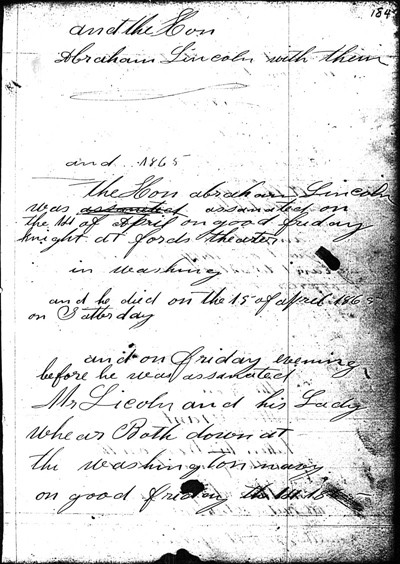
-
Description
Diarist, Michael Shiner, was an African-American Navy Yard worker who chronicled events in Washington D.C over 60 years.
-
Source
-
Rights
This item is in the public domain and may be reproduced and used for any purpose, including research, teaching, private study, publication, broadcast or commercial use, with proper citation and attribution.
-
Creator
Michael Shiner
-
Date
May 1, 1865
from Apr. 16, 1865
Lincoln's Assassination Told by an Eye Witness
-
Full Title
Lincoln's Assassination Told by an Eye Witness
-
Description
A letter written by Julia Adelaide Shepard who was in attendance at Ford's Theatre on April 14, 1865. She wrote to her father on the 16th recounting the Lincoln Assassination. It was printed in The Century Illustrated Monthly Magazine Volume 77 (Nov. 1908 - April 1909)
-
Transcription
LINCOLN’S ASSASSINATION
TOLD BY AN EYE-WITNESS
The letter which follows was written on the date given, by Miss Julia Adelaide Shepard, now living in Ogdensburg, New York. Miss Shepard is an aunt of the artist, Mr. Charles S. Chapman, through whose good offices we are enabled to make it public the first time. – THE EDITOR.
“Hopeton” near Washington.
April 16, 1865
DEAR FATHER: - It is Friday night and we are at the theatre. Cousin Julia has just told me that the President is in yonder upper right hand private box so handsomely decked with silken flags festooned over a picture of Washington. The young and lovely daughter of Senator Harris is the only one of the party we can see, as the flags hide the rest. But we know that “Father Abraham” is there; like a father watching what interests his children, for their pleasure rather than his own. It has been announced in the papers that he would be there. How sociable it seems, like one family sitting around their parlor fire. How different this from the pomp and show of monarchial Europe. Every one has been so jubilant for days, since the surrender of Lee, that they laugh and shout at every clown-ish witticism. One of the actresses, whose part is that of a very delicate young lady, talks of wishing to avoid the draft, when her lover tells “not to be alarmed for there is no more draft, “ at which the applause is long and loud. The American cousin has just been making love to a young lady, who says she will never marry but for love, yet when her mother and herself find he has lost his property they retreat in disgust at the left of the stage, while the American cousin goes out at the right. We are waiting for the next scene.
The report of a pistol is heard…. Is it all in the play? A man leaps from the President’s box, some ten feet, on to the stage. The truth flashes upon me. Brandishing a dagger he shrieks out “The South is avenged,” and rushes through the scenery. No one stirs. “Did you hear what he said, Julia? I believe he has killed the President.” Miss Harris is wringing her hands and calling for water. Another instant and the stage is crowded – officers, policemen, actors and citizens. “Is there a surgeon in the house?” they say. Several rush forward and with superhuman efforts climb up to the box. Minutes are hours, but see! they are bringing him out. A score of strong arms bear Lincoln’s loved form along. A glimpse of a ghastly face is all as they pass along…. Major Rathbone, who was of their party, springs forward to support [Mrs. Lincoln], but cannot. What is it? Yes, he too has been stabbed. Somebody says “Clear the house,” so every one else repeats “Yes, clear the house.” So slowly one party after another steals out. There is no need to hurry. On the stairs we stop aghast and with shuddering lips – “Yes, see, it is our President’s blood” all down the stairs and out upon the pavement. It seemed sacrilege to step near. We are in the street now. They have taken the President into the house opposite. He is alive, but mortally wounded. What are those people saying, “Secretary Seward and his son have had their throats cut in their own house.” Is it so? Yes, and the mur-derer of our President has escaped through a back alley where a swift horse stood awaiting him. Cavalry come dashing up the street and stand with drawn swords before yon house. Too late! too late! What a mockery armed men are now. Weary with the weight of woe the moments drag along and for hours delicate women stand cling-ing to the arms of their protectors and strong men throw their arms around each other’s necks and cry like children, and passing up and down enquire in low agon-ized voices “Can he live? Is there no hope?” They are putting out the street lamps now. “What a shame! not now! not to-night!” There they are lit again. Now the guard with the drawn swords forces the crowd backward. Great, strong Cousin Ed says “This unnerves me; let’s go up to Cousin Joe’s.” We leave Julia and her escort there and at brother Joe’s gather together in an upper room and talk and talk with Dr. Webb and his wife who were at the theatre. Dr. W. was one of the surgeons who answered the call. He says “I asked Dr. ____ when I went in what it was, and putting his hand on mine he said, “There!” I looked and it was ‘brains.’ “
After a while Julia and Mr. W came in and still we talked and listened to the cavalry rushing through the echoing street. Joe was determined to go out, but his wife couldn’t endure the thought of any one going out of the house. It was only in the early hours of the dawn that the gentlemen went to lie down, but Julia sat up in a rocking chair and I lay down on the outside of the bed beside Cousin Ginny for the rest of the night, while Cousin Joe and his wife’s young brother sat nodding in chairs opposite. There were rooms waiting for us but it seemed safer to be together. He was still living when we came out to Hopeton, but we had scarcely choked down our break-fast next morning when the tolling bells announced the terrible truth.
Last Thursday evening we drove to the city, and all along our route the city was one blaze of glorious light. From the humble cabin of the contraband to the brilliant White House light answered light down the broad avenue. The sky was ablaze with bursting rockets. Calcium lights shone from afar on the public buildings. Bonfires blazed in the streets and every device that human Yankee ingenuity could suggest in the way of mottoes and decoration made noon of midnight. Then as candles burned low and rockets ceased, we drove home through the balmy air and it seemed as though Heaven smiled upon the rejoic-ings, and Nature took up the illumination with a glory of moonlight that tran-scended all art.
To-day I have been to church through the same streets and the suburbs with the humble cottages that were so bright that night shone through the murky morning, heavy with black hangings, and on and on, down the streets only the blackness of darkness. The show of mourning was as universal as the glorying had been, and when we were surrounded by the sol-emn and awe-stricken congregation in the church, it seemed as through my heart had stopped beating. I feel like a fright-ened child. I wish I could go home and have a good cry. I can’t bear to be alone. You will hear all of this from the papers, but I can’t help writing it for things seen are mightier than things heard. It seems hard to write now. I dare not speak of our great loss. Sleeping or waking, that terrible scene is before me.
[Transcription by Alicia B., Ford's Theatre Society.] -
Source
-
Rights
This item is in the public domain and may be reproduced and used for any purpose, including research, teaching, private study, publication, broadcast or commercial use, with proper citation and attribution.
-
Tags
-
Cite this Item
Julia Adelaide Shepard. "Lincoln's Assassination Told by an Eye Witness ". The Century Company, New York. Remembering Lincoln. Web. Accessed December 14, 2025. https://rememberinglincoln.fords.org/node/1169
-
Creator
Julia Adelaide Shepard
-
Publisher
The Century Company, New York
-
Date
April 16, 1865
from Apr. 16, 1865
Lincoln's Assassination Told by an Eye Witness
-
Description
A letter written by Julia Adelaide Shepard who was in attendance at Ford's Theatre on April 14, 1865. She wrote to her father on the 16th recounting the Lincoln Assassination. It was printed in The Century Illustrated Monthly Magazine Volume 77 (Nov. 1908 - April 1909)
-
Source
-
Rights
This item is in the public domain and may be reproduced and used for any purpose, including research, teaching, private study, publication, broadcast or commercial use, with proper citation and attribution.
-
Creator
Julia Adelaide Shepard
-
Publisher
The Century Company, New York
-
Date
April 16, 1865
from May. 1, 2018
A Tribute of Respect by the Citizens of Troy
-
Full Title
A Tribute of Respect by the Citizens of Troy, to the Memory of Abraham Lincoln
-
Description
Compiled documents relating to Lincoln's assassination in Troy, New York and the citizen's mourning. It includes sermons, addresses, and minutes from meetings.
-
Source
-
Rights
This item is in the public domain and may be reproduced and used for any purpose, including research, teaching, private study, publication, broadcast or commercial use, with proper citation and attribution.
-
Tags
-
Cite this Item
Various. "A Tribute of Respect by the Citizens of Troy, to the Memory of Abraham Lincoln". J. Munsell . Remembering Lincoln. Web. Accessed December 14, 2025. https://rememberinglincoln.fords.org/node/1168
-
Creator
Various
-
Publisher
J. Munsell
-
Date
1865
from May. 1, 2018
A Tribute of Respect by the Citizens of Troy, to the Memory of Abraham Lincoln
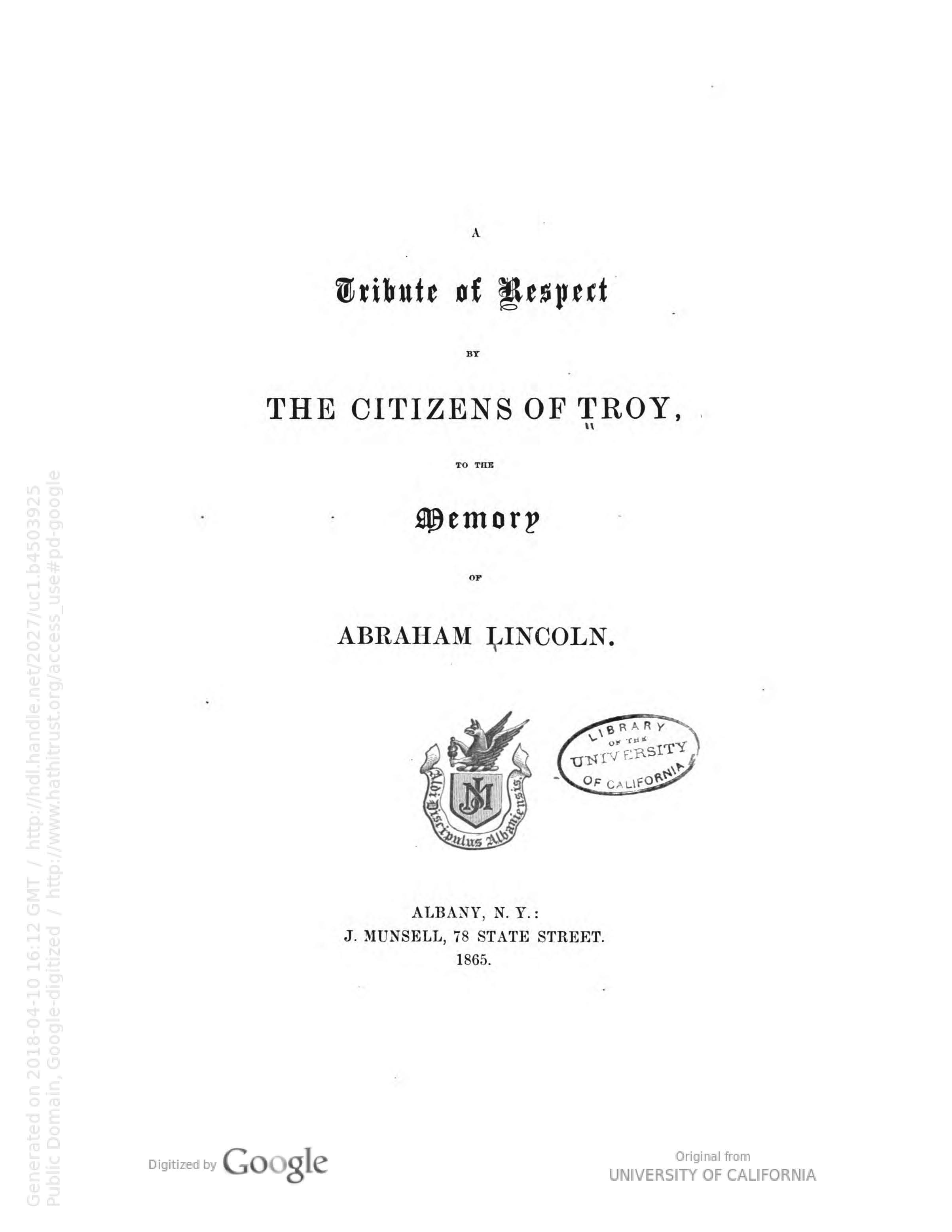
-
Description
Compiled documents relating to Lincoln's assassination in Troy, New York and the citizen's mourning. It includes sermons, addresses, and minutes from meetings.
-
Source
-
Rights
This item is in the public domain and may be reproduced and used for any purpose, including research, teaching, private study, publication, broadcast or commercial use, with proper citation and attribution.
-
Creator
Various
-
Publisher
J. Munsell
-
Date
May 1, 2018
from Apr. 21, 1865
Crowd at the Baltimore depot before the funeral arrived
-
Full Title
Crowd at the Baltimore depot before the funeral arrived
-
Description
A stereogrpahic photograph of the crowd at the Baltimore depot awaiting the funeral train.
-
Source
-
Tags
-
Cite this Item
Ridgway Glover . "Crowd at the Baltimore depot before the funeral arrived". Remembering Lincoln. Web. Accessed December 14, 2025. https://rememberinglincoln.fords.org/node/1167
-
Creator
Ridgway Glover
-
Date
April 21, 1865
-
Dimensions
sheet 8 x 17 cm
from Apr. 21, 1865
Crowd at the Baltimore depot before the funeral arrived
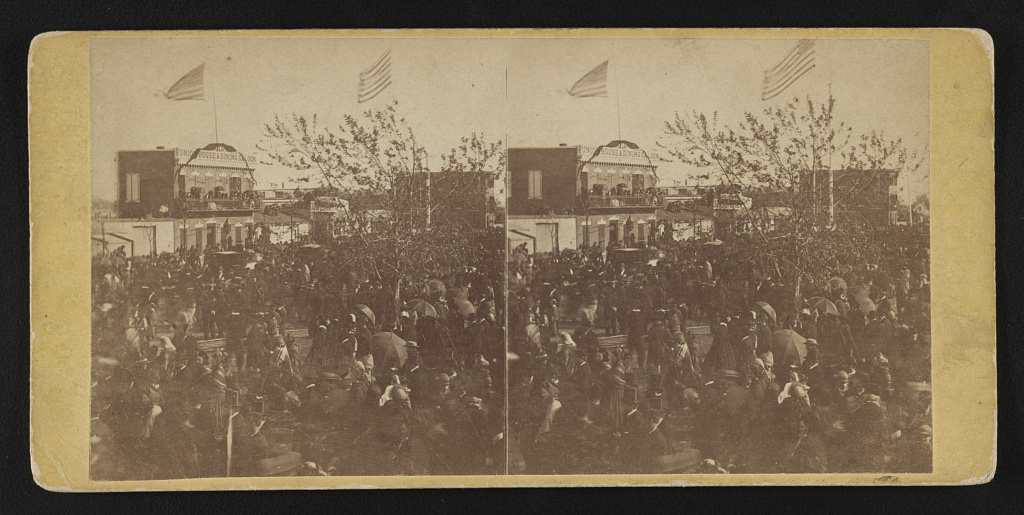
-
Description
A stereogrpahic photograph of the crowd at the Baltimore depot awaiting the funeral train.
-
Source
-
Creator
Ridgway Glover
-
Date
April 21, 1865
-
Dimensions
sheet 8 x 17 cm
from May. 4, 1865
Home of Abraham Lincoln
-
Full Title
Home of Abraham Lincoln
-
Description
Stereographic photograph of Lincoln's home draped in mourning cloth on the day of his funeral.
-
Source
Library of Congress, Prints and Photographs Division, LC-DIG-stereo-1s04301
-
Rights
This item is in the public domain and may be reproduced and used for any purpose, including research, teaching, private study, publication, broadcast or commercial use, with proper citation and attribution.
-
Tags
-
Cite this Item
Ridgway Glover. "Home of Abraham Lincoln". Remembering Lincoln. Web. Accessed December 14, 2025. https://rememberinglincoln.fords.org/node/1166
-
Creator
Ridgway Glover
-
Date
May 4, 1865
-
Dimensions
8 x 17 cm
from May. 4, 1865
Home of Abraham Lincoln
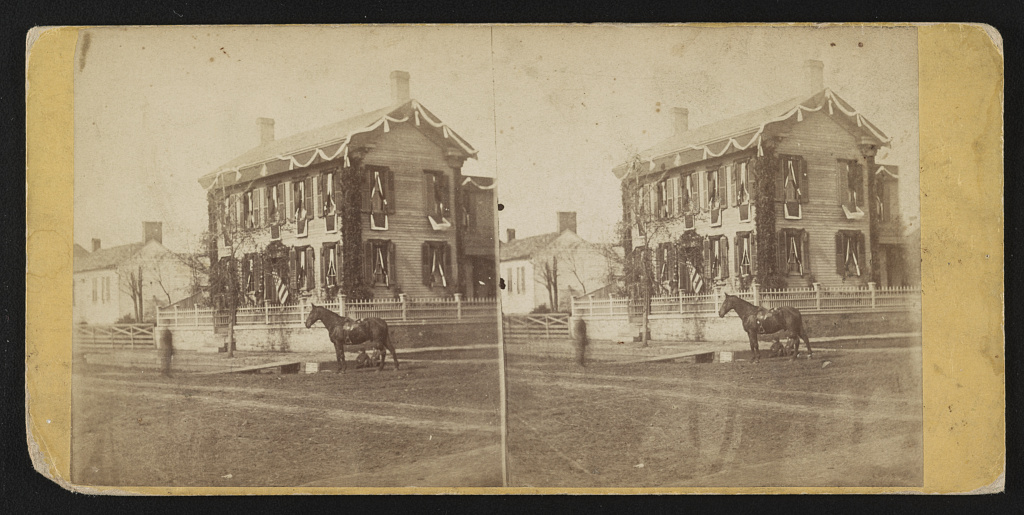
-
Description
Stereographic photograph of Lincoln's home draped in mourning cloth on the day of his funeral.
-
Source
Library of Congress, Prints and Photographs Division, LC-DIG-stereo-1s04301
-
Rights
This item is in the public domain and may be reproduced and used for any purpose, including research, teaching, private study, publication, broadcast or commercial use, with proper citation and attribution.
-
Creator
Ridgway Glover
-
Date
May 4, 1865
-
Dimensions
8 x 17 cm
from May. 1, 1865
Lincoln lies in state, Springfield, May 1865
-
Full Title
Lincoln lies in state, Springfield, May 1865
-
Description
Stereographic photograph of people lining up outside the Illinois State House to view Lincoln's body.
-
Source
Library of Congress Prints and Photographs Division, LC-DIG-stereo-1s04303
-
Rights
This item is in the public domain and may be reproduced and used for any purpose, including research, teaching, private study, publication, broadcast or commercial use, with proper citation and attribution.
-
Tags
-
Cite this Item
Ridgway Glover. "Lincoln lies in state, Springfield, May 1865". Remembering Lincoln. Web. Accessed December 14, 2025. https://rememberinglincoln.fords.org/node/1165
-
Creator
Ridgway Glover
-
Date
May 3-4, 1865
-
Dimensions
8 x 17 cm
from May. 1, 1865
Lincoln lies in state, Springfield, May 1865
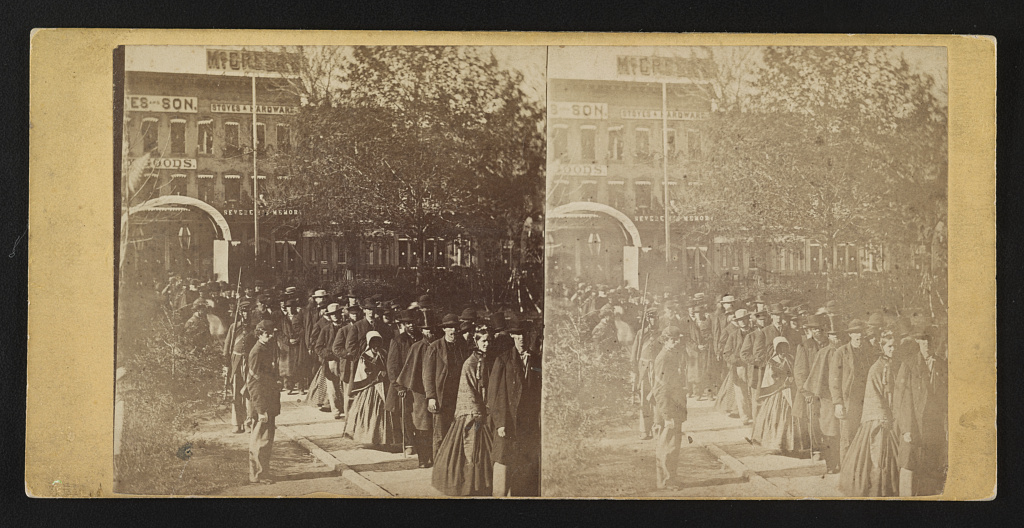
-
Description
Stereographic photograph of people lining up outside the Illinois State House to view Lincoln's body.
-
Source
Library of Congress Prints and Photographs Division, LC-DIG-stereo-1s04303
-
Rights
This item is in the public domain and may be reproduced and used for any purpose, including research, teaching, private study, publication, broadcast or commercial use, with proper citation and attribution.
-
Creator
Ridgway Glover
-
Date
May 1, 1865
-
Dimensions
8 x 17 cm
from May. 1, 1865
Capitol of Illinois, no. 26
-
Full Title
Capitol of Illinois, no. 26
-
Description
A stereographic photograph of the Illinois State House decorated in black and white mourning cloth for Lincoln's funeral.
-
Source
Library of Congress, Prints and Photographs Division, LC-DIG-stereo-1s04304
-
Rights
This item is in the public domain and may be reproduced and used for any purpose, including research, teaching, private study, publication, broadcast or commercial use, with proper citation and attribution.
-
Tags
-
Cite this Item
Ridgway Glover. "Capitol of Illinois, no. 26". Remembering Lincoln. Web. Accessed December 14, 2025. https://rememberinglincoln.fords.org/node/1164
-
Creator
Ridgway Glover
-
Date
May 1865
-
Dimensions
8 x 17 cm
from May. 1, 1865
Capitol of Illinois, no. 26
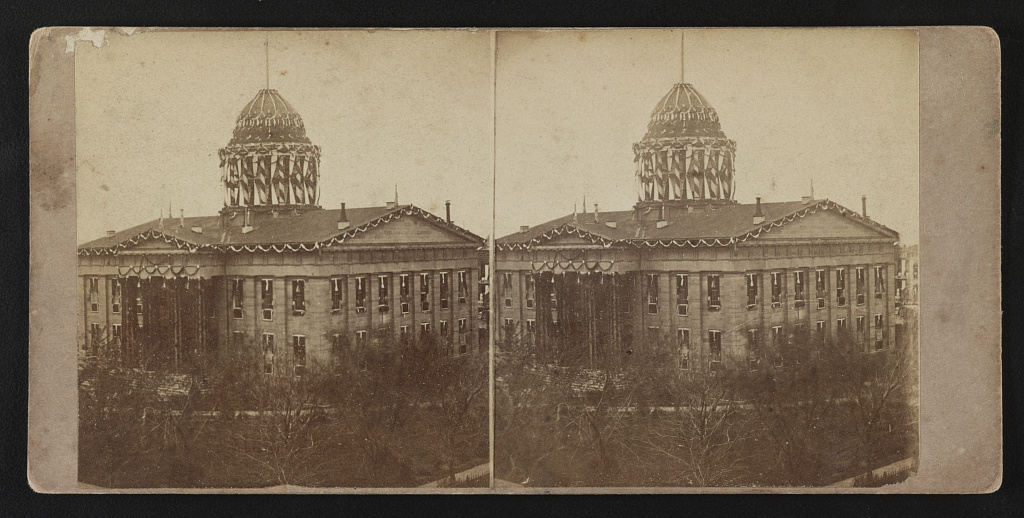
-
Description
A stereographic photograph of the Illinois State House decorated in black and white mourning cloth for Lincoln's funeral.
-
Source
Library of Congress, Prints and Photographs Division, LC-DIG-stereo-1s04304
-
Rights
This item is in the public domain and may be reproduced and used for any purpose, including research, teaching, private study, publication, broadcast or commercial use, with proper citation and attribution.
-
Creator
Ridgway Glover
-
Date
May 1, 1865
-
Dimensions
8 x 17 cm